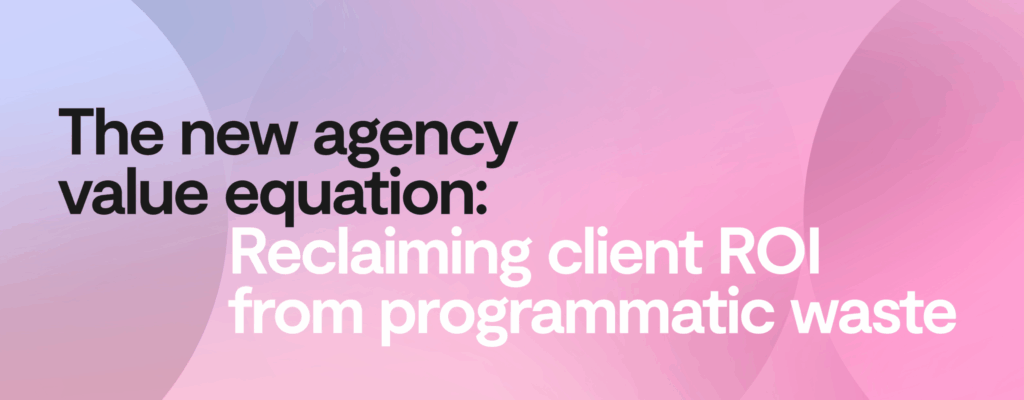- Blog
- First-party data
Three things we learned about creating effective first-party data strategies
Publisher and advertiser first-party data is a valuable asset, and vital for the next generation of privacy-safe advertising. As the media currency shifts from third-party cookies to first-party data, it’s essential to start from a solid foundation. At ExchangeWire’s ATS London, we joined a panel of experts to debate privacy-safe approaches to first-party data management and activation, including how publishers and advertisers can make the most of their most valuable asset. Joining the panel — titled “Putting Your Currency to Good Work: Data Management and Activation” — was Alice Kamara, Specialist Director, Marketing Effectiveness at Zenith; Morika Georgieva, Customer Success…

Publisher and advertiser first-party data is a valuable asset, and vital for the next generation of privacy-safe advertising. As the media currency shifts from third-party cookies to first-party data, it’s essential to start from a solid foundation.
At ExchangeWire’s ATS London, we joined a panel of experts to debate privacy-safe approaches to first-party data management and activation, including how publishers and advertisers can make the most of their most valuable asset.
Joining the panel — titled “Putting Your Currency to Good Work: Data Management and Activation” — was Alice Kamara, Specialist Director, Marketing Effectiveness at Zenith; Morika Georgieva, Customer Success Lead EMEA at Permutive; Femi Taiwo, European Head of Consultancy at Assembly and Paul Hood, Digital Development Director at The Sun, part of News UK. The panel was moderated by Lindsay Rowntree, Head of Operations at ExchangeWire. Here are our top three takeaways.
1. Make sure you have a plan for how you will collect and use data
Data is only useful if you have a plan for how to collect it and make the best use of it; discovering its value can be an iterative process. Hood at The Sun shared how having an online paywall was not a success for the newspaper and they had to pivot. “We thought that a paywall would be key to The Sun’s growth and monetisation strategy but had to abandon it shortly after to retain our number one status. It was apparent to us that scale is more important, supplemented by technology,” he said.
“Our value lies in activation and so we now publish 600 stories a day. The key for us when it comes to data is to try to understand how people engage with our site, identify engagement points and potential value-based transactions. We are better equipped to understand context and intent, and can maintain readers by serving them more content based on their active interests,” Hood added.
“The key for us when it comes to data is to try to understand how people engage with our site, identify engagement points and potential value-based transactions” – Paul Hood, The Sun
Georgieva at Permutive encouraged publishers to look at what data is available, understand how to make it actionable, and bring it to life by creating audiences that will allow publishers to stand out in the market. She said: “Importantly, you should use infrastructure that puts user privacy at its core, rather than treat it as an afterthought. Having reliable technology allows you to focus on bringing content to life and adding value instead of identifying privacy workarounds.”
Manage internal expectations around first-party data
Taiwo at Assembly stressed the key role activation teams should play in helping to plan data strategies: “It’s important to manage tensions internally and understand the consequences — good activation teams will help with that. They can help make sure you are focused more on enablement and scorecard evaluations to help with comfortability on your data strategies,” he said
Kamara at Zenith believes that data needs to be considered as a whole and not in siloes. “Understand everything to do with your data going in — storage, taxonomies and what you can do with it — create strategies with it such as retargeting or feeding back in. If you can’t explain it internally with data literacy, then it’s hard to bring others on board. Have a strategy for measurements, technology, growth and then make effective brand decisions that you can learn from and be able to scale and measure up,” she said.
2. First-party data has massive potential that brands and publishers can maximise
Treating first-party data as the new currency for the industry was something all of the panellists were enthusiastic to champion. Hood said The Sun was focused on trying to simplify and make sure all data is actionable and identifiable in ways that can be communicated internally and externally. He said: “Our focus is to keep data very simple and be very clear on permissions so that it is easier for us to identify what to put into cohorts and be able to constantly serve the next best content in front of those communities.”
Georgieva at Permutive added that while it was important to harness innovation to make first-party data more actionable, it needed to be done in privacy-compliant ways. “It’s important to recognise privacy as a core design principle and build your data infrastructures around protecting privacy,” she said. “A key way to achieve this is by working directly with publishers who have a deep relationship with their readership and can allow you to access and understand your audiences better than ever before without exposing their data.”
“Agencies and publishers have had their reckonings. Brands now need to have this — data ethics will be at the core” – Femi Taiwo, Assembly
First-party data can capture many things from what people read, how long they spend reading, what they interact with on-site, and even surveys to drive user engagement while collecting valuable data points. “There is so much first-party data out there to focus on and evaluate before deciding how to put it to use,” said Georgieva. She advised publishers to identify strengths in their first-party data and how that can be shared with advertisers for efficiency. Georgieva also warned that while authenticated data is valuable “it is not a silver bullet.”
She said: “The days of one-to-one targeting are nearing an end and publishers and advertisers alike must gain an understanding of the rest of their unauthenticated data.”
Ask questions to ensure your first-party data use is relevant
Taiwo at Assembly added that brands themselves were focusing more on first-party data for marketing to their own audiences: “CRM data is becoming more of a win for anonymous content geared around interests. It takes away the need for identity matches that are not scalable. Understanding human behaviour and cohorts is important to not waste messaging and response rates. Engaging with publishers, asking questions and understanding your CRM data potential would be my advice.”
Kamara at Zenith said more needs to be done with first-party data to help long-term planning: “From a top-down perspective, it’s important to go back to how you go about targeting and be creative. How can you take control of this and compare it with your own data analysis? What is the best way to target your audience?” She added: “There are so many clever ways to reach audiences, we should aim to follow and be wary about reducing our scale. Don’t ignore someone by going completely audience-based. Avoid falling into rabbit holes — take a step back and see the full picture.”
3. Make sure that you showcase respect for data ethics
Data ethics were considered vital for all the panellists to maintain brand advocacy and audience engagement. Hood at The Sun said this was vital. “We have a framework whereby we treat everyone based on the consent they have given and if they have provided any other information we can use,” he said. “Controls are in the hands of our customers and based around declared intent. Content has a powerful influence to add a layer of relevancy, which creates a powerful informed objective view of a customer and what their intent might be.”
Georgieva at Permutive added that industry changes were making data ethics even more crucial to audiences. “We already see the ecosystem splitting with Google’s third-party cookies disappearing and Apple’s fragmentation. Instead of waiting, we are seeing publishers take control of their data themselves and be more aware of how to use data and involve consumers in this. Showing respect and appreciation of customer loyalty by using their data in ways that are fair and in line with data policies is essential,” she said.
“There are so many clever ways to reach audiences, we should aim to follow and be wary about reducing our scale” – Alice Kamara, Zenith
Kamara at Zenith agreed, saying: “It’s time to be the master of your own destiny, working in partnership with brands on data strategies and measurements that will open up the can of worms that forces all to think of what they can do to prioritise data ethics in online marketing.”
Taiwo at Assembly summarised the topic, concluding: “Agencies and publishers have had their reckonings. Brands now need to have this — data ethics will be at the core.”
Watch the full panel session on-demand below, and to find out more about how Permutive helps publishers and brands make the most of their first-party data book a demo.
You may be interested in
From scale to accountability: The new agency value equation
Learn MoreThe curation revolution: Rebuilding trust and transparency in programmatic
Learn MoreKeep going, there's more to uncover.
From scale to accountability: The new agency value equation
Discover how leading agencies are rebuilding efficiency and accountability in programmatic media. Learn the 3-step blueprint to reclaim ROI, reduce waste, and deliver verifiable performance through data-enriched PMPs.
The curation revolution: Rebuilding trust and transparency in programmatic
Discover how leading agencies are rebuilding efficiency and accountability in programmatic media. Learn the 3-step blueprint to reclaim ROI, reduce waste, and deliver verifiable performance through data-enriched PMPs.
The performance paradox: Why programmatic efficiency is broken
Discover how leading agencies are rebuilding efficiency and accountability in programmatic media. Learn the 3-step blueprint to reclaim ROI, reduce waste, and deliver verifiable performance through data-enriched PMPs.
The new agency value equation: Reclaiming client ROI from programmatic waste
Discover how leading agencies are rebuilding efficiency and accountability in programmatic media. Learn the 3-step blueprint to reclaim ROI, reduce waste, and deliver verifiable performance through data-enriched PMPs.
Curation as a revenue diversification strategy: Lessons from The Arena Group
The Arena Group is finding new ways to take control of its data and revenue. Discover their powerful new approach centered on curation.
How Acxiom and Fundamental Group are solving for the Outcomes Era
Acxiom’s Ruowen Liscio and Fundamental Group’s Angus Maclaine discuss solutions for the Outcomes Era in advertising. Discover how predictive targeting, curation, and AI are delivering results in a privacy-first world.





